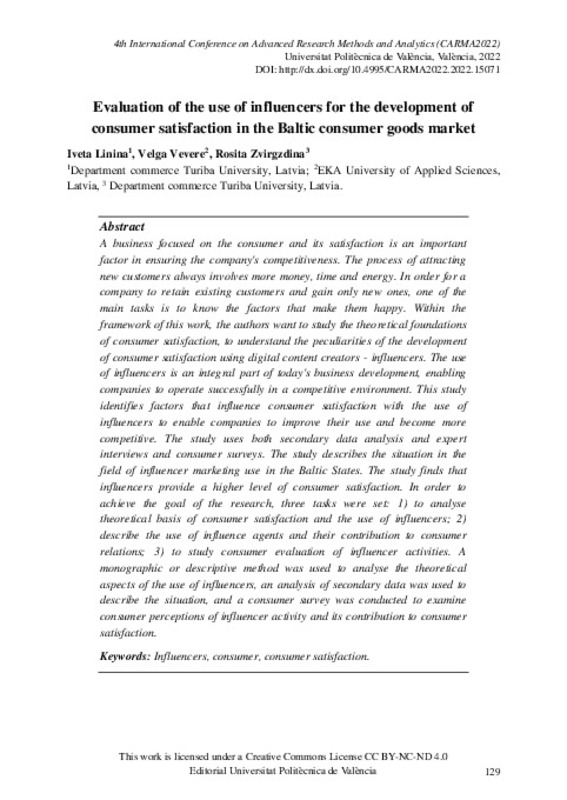JavaScript is disabled for your browser. Some features of this site may not work without it.
Buscar en RiuNet
Listar
Mi cuenta
Estadísticas
Ayuda RiuNet
Admin. UPV
Evaluation of the use of influencers for the development of consumer satisfaction in the Baltic consumer goods market
Mostrar el registro sencillo del ítem
Ficheros en el ítem
| dc.contributor.author | Linina, Iveta
|
es_ES |
| dc.contributor.author | Vevere, Velga
|
es_ES |
| dc.contributor.author | Zvirgzdina, Rosita
|
es_ES |
| dc.date.accessioned | 2022-11-09T10:33:03Z | |
| dc.date.available | 2022-11-09T10:33:03Z | |
| dc.date.issued | 2022-09-20 | |
| dc.identifier.isbn | 9788413960180 | |
| dc.identifier.uri | http://hdl.handle.net/10251/189500 | |
| dc.description.abstract | [EN] A business focused on the consumer and its satisfaction is an important factor in ensuring the company's competitiveness. The process of attracting new customers always involves more money, time and energy. In order for a company to retain existing customers and gain only new ones, one of the main tasks is to know the factors that make them happy. Within the framework of this work, the authors want to study the theoretical foundations of consumer satisfaction, to understand the peculiarities of the development of consumer satisfaction using digital content creators - influencers. The use of influencers is an integral part of today's business development, enabling companies to operate successfully in a competitive environment. This study identifies factors that influence consumer satisfaction with the use of influencers to enable companies to improve their use and become more competitive. The study uses both secondary data analysis and expert interviews and consumer surveys. The study describes the situation in the field of influencer marketing use in the Baltic States. The study finds that influencers provide a higher level of consumer satisfaction. In order to achieve the goal of the research, three tasks were set: 1) to analyse theoretical basis of consumer satisfaction and the use of influencers; 2) to describe the use of influencers and their contribution to consumer satisfaction; 3) to study consumer evaluation of influencer activities. A monographic or descriptive method was used to analyse the theoretical aspects of the use of influencers, an analysis of secondary data was used to describe the situation, and a consumer survey was conducted to examine consumer perceptions of influencer activity and its contribution to consumer satisfaction. | es_ES |
| dc.format.extent | 9 | es_ES |
| dc.language | Inglés | es_ES |
| dc.publisher | Editorial Universitat Politècnica de València | es_ES |
| dc.relation.ispartof | 4th International Conference on Advanced Research Methods and Analytics (CARMA 2022) | |
| dc.rights | Reconocimiento - No comercial - Sin obra derivada (by-nc-nd) | es_ES |
| dc.subject | Influencers | es_ES |
| dc.subject | Consumer | es_ES |
| dc.subject | Consumer satisfaction | es_ES |
| dc.title | Evaluation of the use of influencers for the development of consumer satisfaction in the Baltic consumer goods market | es_ES |
| dc.type | Capítulo de libro | es_ES |
| dc.type | Comunicación en congreso | es_ES |
| dc.identifier.doi | 10.4995/CARMA2022.2022.15071 | |
| dc.rights.accessRights | Abierto | es_ES |
| dc.description.bibliographicCitation | Linina, I.; Vevere, V.; Zvirgzdina, R. (2022). Evaluation of the use of influencers for the development of consumer satisfaction in the Baltic consumer goods market. En 4th International Conference on Advanced Research Methods and Analytics (CARMA 2022). Editorial Universitat Politècnica de València. 129-137. https://doi.org/10.4995/CARMA2022.2022.15071 | es_ES |
| dc.description.accrualMethod | OCS | es_ES |
| dc.relation.conferencename | CARMA 2022 - 4th International Conference on Advanced Research Methods and Analytics | es_ES |
| dc.relation.conferencedate | Junio 29-Julio 01, 2022 | es_ES |
| dc.relation.conferenceplace | Valencia, España | |
| dc.relation.publisherversion | http://ocs.editorial.upv.es/index.php/CARMA/CARMA2022/paper/view/15071 | es_ES |
| dc.description.upvformatpinicio | 129 | es_ES |
| dc.description.upvformatpfin | 137 | es_ES |
| dc.type.version | info:eu-repo/semantics/publishedVersion | es_ES |
| dc.relation.pasarela | OCS\15071 | es_ES |








